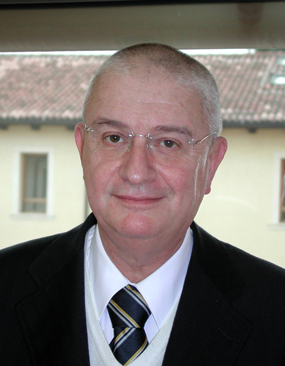Studying at the University of Verona
Here you can find information on the organisational aspects of the Programme, lecture timetables, learning activities and useful contact details for your time at the University, from enrolment to graduation.
Academic calendar
The academic calendar shows the deadlines and scheduled events that are relevant to students, teaching and technical-administrative staff of the University. Public holidays and University closures are also indicated. The academic year normally begins on 1 October each year and ends on 30 September of the following year.
Course calendar
The Academic Calendar sets out the degree programme lecture and exam timetables, as well as the relevant university closure dates..
| Period | From | To |
|---|---|---|
| 1° Periodo di lezioni | Oct 1, 2014 | Dec 16, 2014 |
| Periodo riservato ad eventuali recuperi di lezioni - dicembre 2014 | Dec 17, 2014 | Dec 18, 2014 |
| 2° Periodo di lezioni - febbraio/marzo 2015 | Feb 10, 2015 | Mar 30, 2015 |
| 2° Periodo di lezioni - aprile/maggio 2015 | Apr 8, 2015 | May 5, 2015 |
| Periodo riservato ad eventuali recuperi di lezioni - maggio 2015 | May 6, 2015 | May 8, 2015 |
| Session | From | To |
|---|---|---|
| Sessione straordinaria 14/15 - studenti f.c. - dicembre 2014 | Dec 19, 2014 | Dec 23, 2014 |
| 1° appello - Sessione invernale 14/15 | Jan 8, 2015 | Jan 14, 2015 |
| 2° appello - Sessione invernale 14/15 | Feb 2, 2015 | Feb 7, 2015 |
| Sessione straordinaria 14/15 - studenti f.c. - marzo/aprile 2015 | Mar 31, 2015 | Apr 2, 2015 |
| 1° appello - Sessione estiva 14/15 | May 11, 2015 | May 16, 2015 |
| 2° appello - Sessione estiva 14/15 | Jun 8, 2015 | Jun 13, 2015 |
| 3° appello - Sessione estiva 14/15 | Jul 6, 2015 | Jul 11, 2015 |
| 1° appello - Sessione autunnale 14/15 | Aug 31, 2015 | Sep 5, 2015 |
| 2° appello - Sessione autunnale 14/15 | Sep 24, 2015 | Sep 30, 2015 |
| Session | From | To |
|---|---|---|
| Termine presentazione tesi di laurea - ottobre 2014 | Sep 25, 2014 | Sep 25, 2014 |
| Sessione autunnale 14/15 | Oct 20, 2014 | Oct 21, 2014 |
| Termine presentazione tesi di laurea - gennaio 2015 | Jan 12, 2015 | Jan 12, 2015 |
| Sessione invernale 14/15 | Feb 9, 2015 | Feb 9, 2015 |
| Termine presentazione tesi di laurea - marzo 2015 | Feb 13, 2015 | Feb 13, 2015 |
| Sessione invernale 14/15 - marzo 2015 | Mar 17, 2015 | Mar 19, 2015 |
| Termine presentazione tesi di laurea - luglio 2015 | Jun 8, 2015 | Jun 8, 2015 |
| Sessione estiva 14/15 | Jul 2, 2015 | Jul 3, 2015 |
| Period | From | To |
|---|---|---|
| Festa di Ognissanti | Nov 1, 2014 | Nov 1, 2014 |
| Festa dell'Immacolata Concezione | Dec 8, 2014 | Dec 8, 2014 |
| Vacanze di Natale | Dec 24, 2014 | Jan 6, 2015 |
| Vacanze di Pasqua | Apr 3, 2015 | Apr 7, 2015 |
| Festa della Liberazione | Apr 25, 2015 | Apr 25, 2015 |
| Festa dei Lavoratori | May 1, 2015 | May 1, 2015 |
| Festa del S. Patrono S. Zeno | May 21, 2015 | May 21, 2015 |
| Festa della Repubblica | Jun 2, 2015 | Jun 2, 2015 |
Exam calendar
Exam dates and rounds are managed by the relevant Law Teaching and Student Services Unit.
To view all the exam sessions available, please use the Exam dashboard on ESSE3.
If you forgot your login details or have problems logging in, please contact the relevant IT HelpDesk, or check the login details recovery web page.
Should you have any doubts or questions, please check the Enrollment FAQs
Academic staff
 giovanni.alberti@univr.it
giovanni.alberti@univr.it
 mariacaterina.baruffi@univr.it
mariacaterina.baruffi@univr.it

Dalla Massara Tommaso
 tommaso.dallamassara@univr.it
tommaso.dallamassara@univr.it
 +39 045 8028810
+39 045 8028810
 roberto.flor@univr.it
roberto.flor@univr.it
 rita.maggi@univr.it
rita.maggi@univr.it

Manzoni Elena
 elena.manzoni@univr.it
elena.manzoni@univr.it
 8783
8783
 martina.menon@univr.it
martina.menon@univr.it

Patrono Paolo
 paolo.patrono@univr.it
paolo.patrono@univr.it
 +39 045 8028813
+39 045 8028813
 lorenzo.salvatore@univr.it
lorenzo.salvatore@univr.it
 marcello.stella@univr.it
marcello.stella@univr.it
Strano Silvana
 silvana.stranoligato@univr.it
silvana.stranoligato@univr.it
 +39 045 8028856
+39 045 8028856
 claudio.tomazzoli@univr.it
claudio.tomazzoli@univr.it
Study Plan
The Study Plan includes all modules, teaching and learning activities that each student will need to undertake during their time at the University.
Please select your Study Plan based on your enrollment year.
1° Year
| Modules | Credits | TAF | SSD |
|---|
History of Medieval and Modern Law
Principles of economics
Roman Law Institutions
2° Year activated in the A.Y. 2015/2016
| Modules | Credits | TAF | SSD |
|---|
3° Year activated in the A.Y. 2016/2017
| Modules | Credits | TAF | SSD |
|---|
Legal terminology in a foreign language4° Year activated in the A.Y. 2017/2018
| Modules | Credits | TAF | SSD |
|---|
5° Year activated in the A.Y. 2018/2019
| Modules | Credits | TAF | SSD |
|---|
5 disciplines at choice| Modules | Credits | TAF | SSD |
|---|
History of Medieval and Modern Law
Principles of economics
Roman Law Institutions
| Modules | Credits | TAF | SSD |
|---|
| Modules | Credits | TAF | SSD |
|---|
Legal terminology in a foreign language| Modules | Credits | TAF | SSD |
|---|
| Modules | Credits | TAF | SSD |
|---|
5 disciplines at choiceLegend | Type of training activity (TTA)
TAF (Type of Educational Activity) All courses and activities are classified into different types of educational activities, indicated by a letter.
Comparative constitutional law (2018/2019)
Teaching code
4S01086
Teacher
Coordinator
Credits
6
Language
English
Scientific Disciplinary Sector (SSD)
IUS/21 - COMPARATIVE PUBLIC LAW
Period
1° periodo di lezioni dal Oct 1, 2018 al Dec 14, 2018.
Learning outcomes
The course proposes a critical survey of different constitutional designs and institutes. Among those institutes, it considers constitutional adjudication as one of the main legacies of Western constitutionalism. For this purpose, the course will use the comparative legal method, which is useful in cross-national analyses. In this regard, it proposes classifications of the different models of constitutional review, thus shedding lights on the interrelations between rigidity, enforceability of the constitution and constitutionalism. It then considers cross-fertilisation, as the main form of dissemination of constitutional ideas.
Those attending the course will actively participate in it: during the lectures, the class will discuss and debate the different models for addressing judicial review and examine the most relevant judgements that have contributed in developing the role of supreme and constitutional courts in the protection of the constitutional frameworks (and their principles).
The course also aims to make students capable of assessing the several issues arising in a globalised world, where economic, legal, as well as political factors interact have an impact on constitutional litigation.
Program
Syllabus
The course will be divided into three parts:
1. Comparative method and constitutional law: classifications and models of constitutional adjudication. Political v. judicial review. The French constitutional experience. Constitutional adjudication under Soviet and Islamic constitutions.
The origins of the judicial review: from the English antecedents to the U.S. constitutional history. Concentrated v Diffuse judicial review. Judicial review in common law legal systems. The dissemination of the U.S. model outside the common law realm: Latino-American countries and Portugal. UK and Switzerland. The Kelsenian model and its circulation in Europe. Concrete and Abstract review. Retroactive and Prospective effects of constitutional courts’ decisions.
2. UK constitutional litigation?
2. Judicial Review in Africa.
Bibliography
Students that will attend the lectures must study:
1) Lecture notes;
2) Jo E. Khushal Murkens, “Judicious review: The constitutional practice of the UK Supreme Court,” Cambridge Law Journal, 2018, 1–26;
3) one of the following books:
3a) Charles Manga Fombad, Constitutional Adjudication in Africa (Oxford: Oxford University Press, 2017): Chapt. 1 e two out of chapts. 1-8;
3b) Matteo Nicolini, L’altra Law of the Land. La famiglia giuridica “mista" dell’Africa australe, Bologna, BUP, 2016 (chapters 1-3).
Students that will not attend the lectures must study:
1) Lucio Pegoraro, Giustizia costituzionale comparata. Dai modelli ai sistemi, Torino, 2015.
| Author | Title | Publishing house | Year | ISBN | Notes |
|---|---|---|---|---|---|
| Charles Manga Fombad | Constitutional Adjudication in Africa | Oxford University Press | 2017 | studenti frequentanti: cap. 1 e due a scelta tra i Capp. 2 - 8 | |
| Lucio Pegoraro | Giustizia costituzionale comparata. Dai modelli ai sistemi | Giappichelli | 2015 | studenti non frequentanti | |
| Matteo Nicolini | L'altra Law of the Land. La famiglia giuridica "mista" dell'Africa australe (Edizione 1) | Bolonia University Press | 2016 | studenti frequentanti Capp. 1, 2, 3 |
Examination Methods
For students not attending the course, there will be an oral examination; for students attending the course, there will be a written test.
ERASMUS students are invited to contact professor Nicolini (matteo.nicolini@univr.it) at the beginning of the course in order to set teaching methods and assessment tests.
Teaching materials e documents
-
 programma e testi consigliati (ita/ingl)
(octet-stream, it, 21 KB, 10/09/18)
programma e testi consigliati (ita/ingl)
(octet-stream, it, 21 KB, 10/09/18)
Type D and Type F activities
Modules not yet included
Career prospects
Module/Programme news
News for students
There you will find information, resources and services useful during your time at the University (Student’s exam record, your study plan on ESSE3, Distance Learning courses, university email account, office forms, administrative procedures, etc.). You can log into MyUnivr with your GIA login details: only in this way will you be able to receive notification of all the notices from your teachers and your secretariat via email and soon also via the Univr app.
Language skills
Graduation
Internships
Internships are aimed at enabling students to gain direct knowledge of the world of work and to acquire specific professional skills.
Internships are carried out under the responsibility of an individual lecturer, and can be carried out in professional firms, public administration bodies and companies recognised by the University of Verona.
Any CFU credits gained by doing internships will be recognised and recorded by the University in accordance with the relevant University regulations in force (Regolamento d’Ateneo per il riconoscimento dei crediti maturati negli stage universitari).
For further information on internships, please go to: https://www.univr.it/it/i-nostri-servizi/stage-e-tirocini.











































